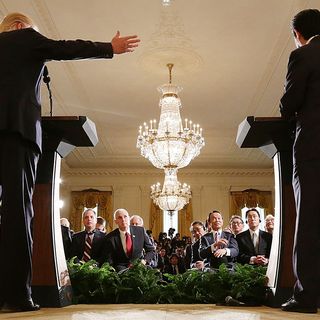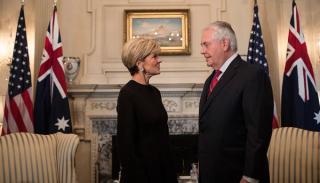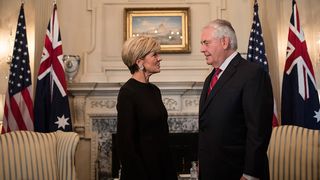President Donald Trump’s administration is rolling out a more confrontational and self-interested Asia policy than that of his predecessor. This is not good news for Australia or the region.
Although the US will support key allies and retain a forward military presence, Trump is likely to stoke unnecessary friction with Beijing, demand more from allies and underinvest in Southeast Asia. His “America first” agenda will put Washington at odds with its Asian partners on issues such as Taiwan and free trade, creating disunity in America’s alliance network.
Australia should adopt a more active regional security strategy to offset these destabilising shifts.
This bleak picture, to be fair, is a work in progress. Trump is a mercurial leader who can shift policies in a tweet and is operating with a skeletal Asia team lacking most key appointments. His stance on Asia could change as personnel choices are fleshed out.
America first: US Asia policy under President Trump

One much-ballyhooed sign of hope is that Defence Secretary Jim Mattis and Secretary of State Rex Tillerson have steered the President towards more status quo positions on Japan, South Korea and the One-China policy. But it may be a mistake to read too much into these trends. Take US-China relations. Trump and advisers such as Steve Bannon and Peter Navarro view Beijing as an aggressive strategic competitor that needs to be checked with US strength. Although Trump begrudgingly backed down on his threat to question the One-China policy, the White House still intends to deepen US-Taiwan defence ties and may use this as a high-stakes way to pressure Beijing.
Trump’s support for US allies in Asia will also be tougher and more transactional. True, it’s encouraging to hear Trump, Mattis and Tillerson voice support for Washington’s “iron-clad” commitments to Tokyo and Seoul. But beneath this sheen the White House is on the hunt for greater burden-sharing and tweetable “wins” for American jobs. Australia has learned first-hand from Malcolm Turnbull’s notorious phone call that Trump will recklessly scrutinise what the US wins and loses from the alliance.
And if the region hoped Barack Obama’s “pivot to Asia” would stay intact, it will be disappointed. Trump has abandoned US leadership on regional trade architecture by cancelling the Trans-Pacific Partnership. He also may gut America’s capacity to wield diplomatic power and provide developmental assistance by slashing the State Department’s budget, even as he advances the security elements of the pivot.
By persisting only with a military rebalance, Trump’s Asia strategy will take on a harder edge and become disaggregated from key economic and diplomatic pillars of America’s regional role.
This will leave Southeast Asian countries in a particularly precarious spot. If the US loses interest in championing the liberal internationalist goals of the pivot, initiatives that matter to the region — such as strong US-Association of Southeast Asian Nations ties, governance support and capacity-building — will be neglected. US staying power in Asia will be called into question. And vulnerable Southeast Asian nations may, in turn, recalibrate trade strategies towards Chinese initiatives and become more susceptible to Beijing’s economic statecraft and other forms of influence.
The overall effect of Trump’s “America first” Asia policy will be to make regional relations more volatile, not just between the US and China but also between the US and its regional partners. Inflaming US-China tensions would be out of step with most Asian nations’ preference for stable ties with Beijing.
Trump’s disdain for regional order-building and instinct to squeeze allies will clash with national interests and public opinion across the Asia-Pacific.
Australia should not passively accept Trump’s Asia policy and stand by as relations between like-minded regional partners fray. Canberra should adopt a more active security policy in the Asia-Pacific to hedge against these risks.
As a trusted US ally with close ties in Beijing, Australia can offer careful input into US-China relations and help the US to articulate priorities on China so pressure is exerted on high-value issues — such as trade reciprocity and North Korea — in parallel with America’s Asian partners.

Moreover, Australian officials should use their knowledge of US intentions to clarify the mixed messages about Trump’s Asia policy that trickle out in tweets and leaks. Australia also needs to work multilaterally with like-minded Asian partners to communicate shared interests, opportunities and red lines to America. Notwithstanding some differences in opinion, Australia, Japan, South Korea, Singapore and Indonesia, to name a few, all want the US to remain committed to a stable, liberal and principled regional order.
This message will resonate more with Trump’s cabinet than with the President, as departmental preferences in Defence and State are more attuned to allied interests. Co-ordination between security partners such as Australia and Japan also will help to ensure that Trump’s transactional alliance politics don’t create gulfs among nations whose threat perceptions are not entirely aligned.
Australia should build resilience into the US Asian alliance network by establishing new partnerships with Southeast Asia, starting with an Australia-Indonesia-Japan grouping. Given Trump’s questionable resolve and China’s growing influence, it is crucial that capable countries such as Australia work with Southeast Asian nations to advance collective goals in military capacity-building, trade standards and institution building.
In all of this, Canberra needs to assume a more active leadership role by independently contributing to a stable and liberal regional order. By investing more heavily in ASEAN ties, spearheading a new Asian trade agenda and contributing more to collective security assets, Australia can bolster regional stability while complementing its enduring alliance with the US.






